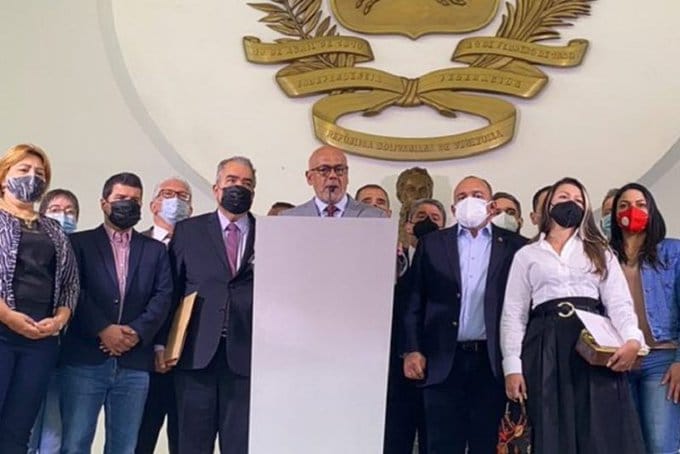
President of Venezuela's National Assembly, Jorge Rodriguez, during a press conference informing about the new dialogue approach. Photo: Twitter / @RedRadioVE.

Orinoco Tribune – News and opinion pieces about Venezuela and beyond
From Venezuela and made by Venezuelan Chavistas

President of Venezuela's National Assembly, Jorge Rodriguez, during a press conference informing about the new dialogue approach. Photo: Twitter / @RedRadioVE.
Tuesday, March 15, the president of Venezuela’s National Assembly (AN), Jorge Rodríguez, explained the conditions of a new format for dialogue with members of the opposition.
During a meeting of the Dialogue Commission for Peace and National Reconciliation, Rodríguez highlighted three fundamental issues related to the need, mentioned also by President Nicolás Maduro, to “reformat” the political dialogue in Venezuela.
Rodríguez said that the reformatting will consist of expanding the inclusivity of the dialogue, “where we can all be represented, including cultural media, those working in the fishing industry, youth, economic sectors, workers, business, so-called civil society, academic circles, students, among others. All sectors have the right to join the dialogue, to take the floor in that dialogue process.”
As a second issue, said Rodríguez during a press conference from parliament, “in political dialogue it is clear that there is a roadmap, which, as in all historical circumstances, is changing.”
RELATED CONTENT: Guaidó Implores Biden to Level More Sanctions Against Venezuela
He commented that the political landscape of 2006 is not the same as that of Venezuela in 2019, or as that following the mega-elections of 2021, “where absolutely all the political forces of the country participated in the process”—referring both to the forces that make up the Great Patriotic Pole and to the different factions of the opposition in Venezuela.
“In this way, it is necessary to attend to the post-electoral political picture to understand that the conditions of the dialogue are no longer the same,” Rodríguez said. He proposed incorporating all political sectors in the dialogue.
Rodríguez recalled that some opposition actors have called for invasions, others for violence, and many have followed the dictates of foreign powers. Other sectors of the opposition have been consistent with their nationalist character, and have respected the Constitution.
A qualitative factor went into the reformatting of the dialogue, added Rodríguez: “When the dialogue began in 2017, it was in the context of political conflict. Now it is a dialogue of a country at peace. Here there are political guarantees for everyone.”
Rodríguez explained that the country went from conflict with the economic and political sectors of the country, to integrating all the sectors of society.
Business rounds
During the press conference, Rodríguez said that President Nicolás Maduro has recommended holding an intensive round of consultations and meetings with all Venezuelan opposition actors, as well as economic and social leaders.
“We are going to ask all the heads of the Venezuelan opposition political parties, and Dr. Gerardo Blyde [campaign manager of the Democratic Roundtable opposition coalition] for a meeting,” said Rodríguez. “We want to know the true perspectives of the Venezuelan people.”
Finally, the president of the parliament explained that input received will be worked on and discussed, and when the needs of the contributors are reached, the new dialogue process will take place.
Alex Saab’s status
During the meeting Rodríguez mentioned that the kidnapping of diplomat Alex Saab by the United States, which he described as an “attack” on the Mexico Talks. “We have said in all the forums, in all the meetings, in all the diplomatic meetings, and in all the discussions that we have held with the opposition, that Alex Saab is a full member of Venezuela’s dialogue delegation.”
“What happened to Alex Saab,” added Rodríguez, “the kidnapping in Cape Verde, and his subsequent abduction or transfer, in an untimely manner, to the United States of America, directly attacked the process of the dialogue in Mexico, that was already bearing important fruits for the Venezuelan population.”
Featured image: President of Venezuela’s National Assembly, Jorge Rodríguez, during a press conference about the new dialogue approach. Photo: Twitter/@RedRadioVE.
(RedRadioVE) by Narkys Blanco with Orinoco Tribune content
Translation: Orinoco Tribune
OT/JRE/SL/EF